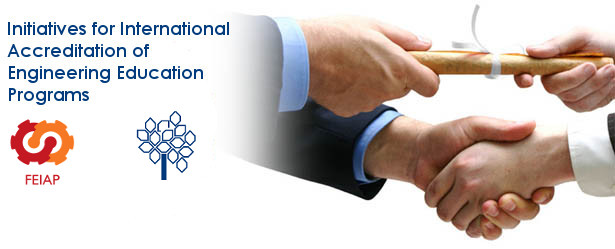

President orge Spitalnik attended on December 2nd the International Forum on Accreditation and Professional Licensing of Engineers in Latin America and the Caribbean, organized by FEIAP in Lima, and made an invited introductory speech on WFEO position on international systems for engineering education accreditation.
See below the full text of President Spitalnik, or download it.
Engineering develops methods and systems based on scientific knowledge, economy principles and appraisal of the state of the art of available technology to improve society’s quality of life. This mission, aiming at increasing the life standards of the population, in essence implies that the Engineer practices his/her profession with a clear social dimension. In this respect, it can be said that the Engineering professional is able to exercise his/her profession within any society’s existential contexts.
It is therefore of crucial importance to ensure a certain uniformity of content and deepness in the academic education and training of the engineer as well as his/her critical thinking to allow a professional practice akin with the quality standards in existence in other countries. Consequently, a global mobility of Engineering professionals will be feasible.
WFEO has a natural authority to contribute in promoting and establishing conditions for mobility of WFEO National Members’ engineers, in different regions of the world. This is an important activity for the creation of international Engineering partnerships.
WFEO believes in an engineering profession of well-qualified, up-to-date engineers, working ethically and responding to the needs of their clients who may have little or no engineering knowledge.
WFEO’s way to achieve this objective has been to sign cooperation agreements with organizations that have multi-lateral agreements, like the International Engineering Alliance (IEA). Currently, the IEA’s Washington Accord recognizes the substantial equivalency of programs accredited by:
- Engineers Australia;
- Engineers Canada;
- Institute of Engineering Education, Chinese Taipei;
- The Hong Kong Institution of Engineers, Hong Kong, SAR of China;
- Engineers Ireland;
- Japan Accreditation Board for Engineering Education;
- Accreditation Board for Engineering Education of Korea;
- Institution of Professional Engineers New Zealand;
- Institution of Engineers Singapore;
- Engineering Council of South Africa;
- Engineering Council UK;
- U.S. Accreditation Board for Engineering and Technology;
- Board of Engineers, Malaysia;
- Association for Evaluation and Accreditation of Engineering Programs of Turkey;
- Association for Engineering Education of Russia;
- Institution of Engineers Sri Lanka;
- National Board of Accreditation India
- and China Association for Science and Technology
In 2015, WFEO signed a Cooperation Agreement with IEA, built on an earlier Memorandum of Understanding (MOU), aiming at establishing multilateral systems of accreditation and evaluation of professional competence globally. This Agreement highlights the importance of setting up global standards for qualifications accreditation and professional capacity of the engineer, leading to the development of national structures for Engineering accreditation and the establishment of national bodies for assessing the professional competence of their engineers.
The current Washington Accord membership, involving countries with top Engineering Schools and Universities, attests the high level of standards being applied by IEA for recognizing equivalence of accreditation of educational programs. The fact that such activity is successfully performed by an organization managed by Engineering communities, independently of government influence, in keeping with the essence of the profession is in line with the essential concept of entrusting the profession to educate and police its practitioners. This is the corner-stone of international recognition, which must be jealously guarded.
In fact, accreditation and competence assessment by international organizations allows licensing systems of different countries to be compared and to identify those that have similar quality standards for their engineers’ professional practice. But, it does not by itself lead to automatically allowing those professionals practice in the other country. This is the responsibility of the national organization with this function that makes such organization being accountable to Society for assuring good practice by their licensed engineers and, therefore, it is the national system that will have to respond on the proficiency of a licensed engineer involved in lawsuits or professional malpractice.
WFEO will support initiatives leading to the enhancement of programs to promote the global mobility of Engineering professionals. Programs for accreditation, like the FEIAP accreditation review, must ensure that the engineering educational standards they will apply are of similar level of quality to those being used by other organizations like IEA or EUR-ACE. In this respect, it is relevant to quote a resolution approved by the Pan American Union of Engineers (UPADI), at their annual meeting, last month in Panama, recommending its member organizations to adopt international systems of engineering educational accreditation that have substantially equivalent evaluation standards.
Without similar standards of quality, we might end up with a two-tier system of accredited Engineers: those with A standard and those with B standard. And this, WFEO will not be able to support.
By Jorge Spitalnik, WFEO President
JAN
2017
